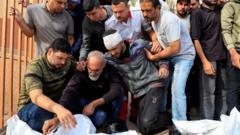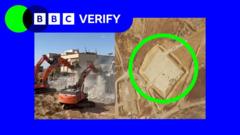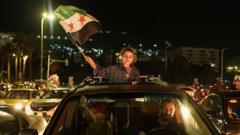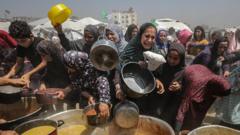**The use of drones by paramilitary forces highlights a shift in strategy and raises the stakes for both military factions in Sudan.**
**Drone Warfare Escalates in Sudan's Civil Conflict**
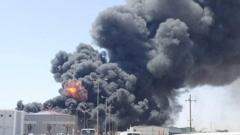
**Drone Warfare Escalates in Sudan's Civil Conflict**
**Unprecedented drone strikes mark a new phase in Sudan's ongoing civil war.**
In a significant escalation of the ongoing civil war in Sudan, the Rapid Support Forces (RSF) have commenced a series of drone attacks on Port Sudan, intensifying their campaign after being ousted from the capital. This new tactic, seen as a "shock and awe campaign," is notable as it targets vital infrastructure in what was previously viewed as a bastion of safety. Following the Sudanese Armed Forces' (SAF) reclaiming of Khartoum, the RSF's drone strikes have led to severe power outages and water shortages for the citizens of Port Sudan.
According to Alan Boswell from the International Crisis Group, this demonstrates a military capability that has not been seen before in the region. The RSF's recent aerial assaults indicate a commitment to continue their fight despite earlier territorial defeats. This development not only signifies the evolution of drone warfare in Africa but also reflects a shift in operational strategy as the RSF emphasizes remote strikes to disrupt government control.
The civil conflict between the SAF and RSF began as a struggle for power but has evolved into a complex war involving various armed groups and international interests, causing one of the most severe humanitarian crises, according to the UN. With the use of drones becoming increasingly commonplace, both factions have resorted to leveraging advanced unmanned capabilities to assert their dominance.
The RSF has been launching attacks on civilian infrastructure in areas controlled by the army, including crucial dams and electricity facilities. The strategic drone strikes on Port Sudan suggest the RSF's attempt to make an impact without direct ground assaults, aiming to reshape the narrative around the war following their losses.
Experts have speculated on the sophistication of the drones employed, with indications that the RSF may have received advanced technology from foreign backers, further complicating the conflict dynamics. With accusations of war crimes and external validation of military support from countries like the UAE and Iran, the battle for Sudan is becoming increasingly intertwined with regional politics.
The ongoing drone warfare is not only raising concerns over civilian safety but also poses a threat to regional security, prompting calls for international intervention to address the escalating conflict. Disruptions caused by these attacks are anticipated to complicate humanitarian efforts even further, underscoring the dire need for diplomatic resolutions to bring an end to the cycle of violence.
As experts highlight the potential for the war to persist for years without significant diplomatic engagement, the future remains uncertain. The RSF's newfound capability to strike critical targets hundreds of kilometers from their base marks a poignant shift in the traditional dynamics of warfare, with implications far beyond the borders of Sudan.
According to Alan Boswell from the International Crisis Group, this demonstrates a military capability that has not been seen before in the region. The RSF's recent aerial assaults indicate a commitment to continue their fight despite earlier territorial defeats. This development not only signifies the evolution of drone warfare in Africa but also reflects a shift in operational strategy as the RSF emphasizes remote strikes to disrupt government control.
The civil conflict between the SAF and RSF began as a struggle for power but has evolved into a complex war involving various armed groups and international interests, causing one of the most severe humanitarian crises, according to the UN. With the use of drones becoming increasingly commonplace, both factions have resorted to leveraging advanced unmanned capabilities to assert their dominance.
The RSF has been launching attacks on civilian infrastructure in areas controlled by the army, including crucial dams and electricity facilities. The strategic drone strikes on Port Sudan suggest the RSF's attempt to make an impact without direct ground assaults, aiming to reshape the narrative around the war following their losses.
Experts have speculated on the sophistication of the drones employed, with indications that the RSF may have received advanced technology from foreign backers, further complicating the conflict dynamics. With accusations of war crimes and external validation of military support from countries like the UAE and Iran, the battle for Sudan is becoming increasingly intertwined with regional politics.
The ongoing drone warfare is not only raising concerns over civilian safety but also poses a threat to regional security, prompting calls for international intervention to address the escalating conflict. Disruptions caused by these attacks are anticipated to complicate humanitarian efforts even further, underscoring the dire need for diplomatic resolutions to bring an end to the cycle of violence.
As experts highlight the potential for the war to persist for years without significant diplomatic engagement, the future remains uncertain. The RSF's newfound capability to strike critical targets hundreds of kilometers from their base marks a poignant shift in the traditional dynamics of warfare, with implications far beyond the borders of Sudan.

